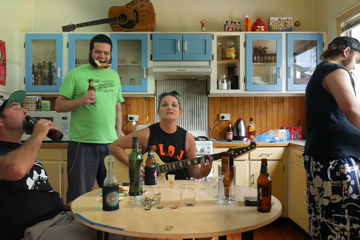"I was talking about circuit-bending with a like-minded cohort at a particularly messy house party in Santa Cruz,” begins enthusing Alexander Dennis aka EPROM, explaining his earlier fascination with integrating technology with producing music. “We ended up staying up all night, until the thrift stores opened the next morning. We walked all the way downtown and bought a bunch of kids toys – whatever we could get our hands on that made sound. We took them all back to my house and began pulling them open and coaxing strange sounds out of them. That definitely engendered my fascination with broken synths and glitchy sounds. I still have a huge library of alien monologues that we extracted out of a tortured Speak & Spell [toy].”
It's not surprising Dennis mentions aliens near the start of our conversation. After all, this is a dude who produces music that sounds so futuristic it could easily be the soundtrack to a dirty underground bar on Tatooine that's serving up illegal, mind-altering glasses of bright blue nitrous oxide bubble-infused liquid to three-headed space gangsters simultaneously nodding to the beat. In fact, many of EPROM's songs on his deal-breaking album released mid this year, Metahuman, seem to evoke vivid imaginations, critics often drawn to colourfully express what exactly the sinister, other-worldly, robotic imagery might be. So what visions did Dennis have in his EPROM headspace?
”I made the album over a period of two years, so I didn't have a particular narrative in mind,” Dennis responds. “I think the narrative came out as I was putting it together. Most of my tracks are already about dark, futuristic themes. The artists Menno Fokma and Floris Vos, who did the cover art, came up with a theme and a story based on the title Metahuman. They imagined a world in which the sun had burned out and people had to adapt to that situation. So that influenced me as I was doing the final mixdowns of the tracks and naming some of them. It was a creative feedback loop.”
Considering Dennis studied film at a university in Santa Cruz, his focus on visuals and narratives make sense. Yet, in-between classes, Dennis was also spending increasing amounts of time in clubs. You know, 'researching'. “I learned most of my production technique through the drum'n'bass scene – that focus on extreme dancefloor technique really resonated with me,” he recalls. Dennis now calls San Fran home enough to create an EP in its honour – The Bay Area EP – and it's here where his sound really started to evolve into what you hear today in pimpin' tracks such as Regis Chillbin. “When I discovered hyphy rap, I began integrating those beat patterns into my music, but with a focus on sound design. It was music that built off of that framework of the hyphy rhythm, but there was no space for a vocalist because I have always been more interested in populating the frequency spectrum with my own sounds.
Don't miss a beat with our FREE daily newsletter
”It's interesting that you mention film, because in recent years, especially in the process of crafting the album, film music has resurfaced as a major influence for me,” Dennis continues. “The scores and soundtracks of people like Edward Artemyev, Vangelis and Art Of Noise were things I grew up on, but I am just now beginning to appreciate the sonic complexity and sheer artifice and novelty of those sounds. If I can capture a moment of dystopian beauty in one of my songs, I learned it from those early soundtracks.”
Whatever's inspiring him, it's working – Metahuman's 13 tracks of glitch hop, future bass, post-grime and general low-slung badassness earning him respect with the likes of FlyLo, Gaslamp, Shadow and Rustie, as well as the adoration of critics all over, from Resident Advisor to XLR8R. Not bad for a tech-head who revealed a few years back it generally takes three to four sessions to bang a track together.
”These days I do a lot of work on hardware synths,” starts explaining Dennis of the production process (non-music geeks look away). “My most used equipment is the Moog Little Phatty and Korg Mono/Poly. I do most of my bassline work on the Moog. I'll usually set up a MIDI loop and dial up a preset, and then manipulate it until it is unrecognisable. Then I will loop a pattern and tweak the knobs on the Moog and record it all. This gives me a ton of source material to work with, and it's really easy to create a sense of motion and tension and release by slowly changing parameters. I think the important part of that process is how it adds a physical aspect to music creation. If you do everything in the computer software, you have to draw in all the automation or use a MIDI controller to get that expressiveness. So analogue synths actually accelerate my songwriting process.”
So where does chiptune and circuit-bending now fit into his repertoire? “I am fascinated by 8-bit timbres more than I fetishise the technology itself. I approach 8-bit aesthetics as another sonic characteristic to explore. If it works in the song, I'll use it. I'm not working within the 'chiptune' genre. Chiptune artists do all of their music on game or retro hardware. I use modern computer software. I am inspired by chiptune artists and the sounds they can coax out of old hardware. I think that's a futuristic ethos, to use outmoded technology to create new sounds. It's a hacker mentality and I can really appreciate that.”
Okay, you still with us non-techies/musos? Good, because shit's about to get real. With all this futuristic chatter going on, why not discuss future consciousness among machines and the creation of music… ”A lot of futurists talk about a tipping point of artificial intelligence, where an AI can pass for a human in casual conversation,” proffers Dennis. “We may reach that point within my lifetime. In the meantime, we can do interesting things with the limited AI we have now in the musical realm, even before AI develops conversational facility or crosses the threshhold of simulating the human mind. Music is governed by mathematical relationships, and computers are already really good at dealing with math. There are already software programs that can convincingly simulate a Bach sonata. There is a certain human element that is lacking in those generative sonatas, however. Can we know what that element is – that spark? That's the hard problem, I think. Whether an AI can create a dancefloor banger is a question for the future.”
As for the ol' standard question: what can expect from his set? Not surprisingly, he doesn't give a standard response. “I like to take extreme timbres and crazy sounds and wrap them around accessible melodies and drum patterns. It's still dance music, but dance music for me has always been about the unexpected… I would rather find an alien sound and push it to its absolute limit than rest in the comfort of yesterday's sounds.”
EPROM will be playing the following shows:
Friday 30 November - The Hi-Fi, Brisbane QLD
Saturday 1 December - The Bakery, Perth WA
















